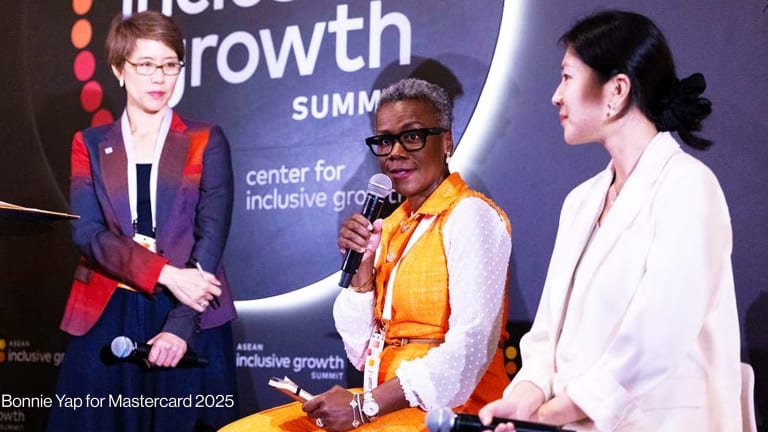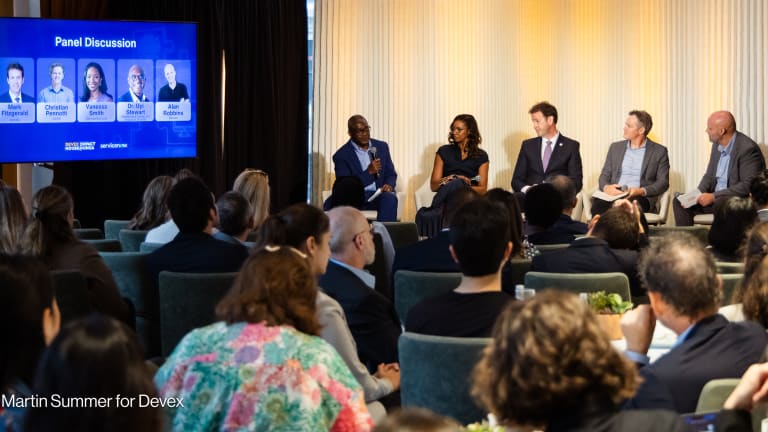
There is potential for data and artificial intelligence to meaningfully support communities, but it requires a focused effort to ensure that the benefits are equitably distributed.
“When we think about data and AI, it has to work for everyone — for someone like me, in a U.S. city, and for the woman entrepreneur in northern Nigeria,” said the Chief Operating Officer at data.org Cormekki Whitley, who holds a doctorate in financial management. As the organization launches its new Asia Pacific Data Capacity Accelerator, Whitley highlights the importance of training people to look at data in ways that benefit their communities — particularly in financial inclusion.
Founded in 2020 with support from the Mastercard Center for Inclusive Growth and The Rockefeller Foundation, data.org is committed to broadening access to tools, skilled professionals, and emerging technologies to drive sustainable and equitable social impact.
With Capacity Accelerator Network hubs already operating in Africa, India, Latin America, and the United States, the new APAC hub aims to engage local partners and communities in creating purpose-driven data and AI practitioners to drive financial inclusion.
Speaking with Devex, Whitley shared data.org’s plans to train 1 million purpose-driven data AI practitioners, insights on the opportunities that have drawn them to the APAC region, as well as the learning they will bring forward from other continents.
This conversation has been edited for length and clarity.
Could you tell us a bit about your journey to data.org and what initially drew you to data-focused work, especially in the realm of financial inclusion?

This question takes me back to what first started me on my journey of financial inclusion and advocacy. Early in my career, I worked at a financial institution, handling various loans — banking, retail, and mortgage. I remember one client whose daughter asked me to look at her mother’s mortgage. She was an older Black woman, and when I looked at her mortgage paperwork I was surprised. Despite having great credit and being in her home for quite some time, she was paying nearly double what was reasonable for a mortgage of that size. When I started to dig through, I saw she was required to pay mandatory insurance and other ancillary fees that I now recognize as predatory. At that point, I didn’t understand why this was happening. Nevertheless, I was able to redo her mortgage.
What impacted me, even more, was when she then referred about 10 more members from her community, and I just thought, “Oh, this was great, how can I help people in their financial journey?” This experience has stayed with me throughout my life, including when I was working on my Ph.D. At that time, North Carolina was repealing its predatory lending law, with claims that more regulation would hinder the mortgage market from serving underrepresented areas. But the data I found contradicted that.
So different pieces in my career have been important in how I think about advocating for people left out of the system. I think it eventually led me here to data.org, where I continue this work with a focus on data-driven advocacy for financial inclusion.
Could you speak to how data.org’s work in financial inclusion addresses issues such as fair lending and equitable access to financial resources?
Going back to that story, what I enjoy about data.org is that it approaches financial inclusion with a global impact lens. In my previous role, I could directly help maybe a dozen people. But data.org has the ability to impact thousands — our goal is a million — of people worldwide. That scale of impact, aligned with data.org’s values around localism and making sure that people impacted are part of the solution, is something you want to be part of.
I was struck by Women’s World Banking, one of data.org’s awardees around financial inclusion from our first innovation challenge, hosted in partnership with the Mastercard Center for Inclusive Growth and The Rockefeller Foundation. We were supporting their work in examining gender biases in credit systems across Mexico, Colombia, and India. And they found that women were being systematically excluded by certain algorithms. This type of work — uncovering how people are excluded and advocating for systemic change — is central to data.org’s mission and comes back to my values around advocacy.
What role do data and AI play in creating more equitable financial systems, and how can data.org accelerate the development of these applications?
Good AI needs high-quality data and skilled people trained to look at it in ways that benefit their communities. That’s where the advocacy lens comes in again: How do you make sure that people on the ground can use these advances to better their systems?
GIEVA, an awardee from our Generative AI Skills Challenge, hosted in partnership with Microsoft, is using AI to support women entrepreneurs in northern Nigeria. These women are now using AI, trained on their own data, to learn how to market their products and services more effectively. When you consider the impact of women being able to uplift each other within their communities, I think that’s where the sweet spot of combining data and AI lies.
As chief operating officer, what’s your main focus for 2025?
My focus for next year, and through 2032 until we meet our goal, is to train 1 million purpose-driven data and AI practitioners. That means women and people who have been left out of the system and historically marginalized communities.
It’s also important as a global organization to lift up the stories that come out of this data and AI “revolution” — such as Women’s World Banking and GIEVA — because we need to see the human user and impact. I think data.org has done a great job of elevating these initiatives and sharing them in other countries and contexts that could benefit from their technology and approach. And then personally, one of the things I’m excited about in 2025 is the launch of our financial inclusion hub in the APAC region.
The launch of the Asia Pacific Data Capacity Accelerator is coming up on Nov. 22. Could you give us a sneak peek of what this new hub will focus on? As well as what makes the APAC region a priority for data.org?
As a region, Asia brings significant strengths in data and AI capabilities, and in developing fintech solutions that unlock growth. The key now is to ensure that the growth is inclusive, bringing a broad swath of people into the financial system with a lens of equity.
And so we’re working with partners on the ground to develop a set of curricula on financial inclusion, tailored for entrepreneurs, fintech startups, and civil servants in the area and focused on data literacy and financial empowerment. It’s a similar approach to our other CAN hubs, and with each new region, we grow the global network, add purpose-driven capacity to the workforce, and learn from the work being done by academic partners, social impact organizations, and frontline workers in these communities.
What are some of the unique challenges and opportunities in this region?
The APAC region is very diverse, and we already have many people reaching out and wanting to partner with us. I think they know we value the work already being done, and they see the potential to extend these efforts to areas they may not reach regularly. So again, thinking about women and underrepresented communities. There are opportunities to support and skill up the local workforce and make a big impact.
What’s needed for digital finance to reach women in conflict zones
Women’s livelihoods are the first to suffer during conflict. Reaching them with digital financial services could provide an important lifeline.
There is also an opportunity to work within the community. It’s an exciting time for us to share what we’ve learned and to collaborate with partners on the ground.
On the other hand, this large population brings different cultural practices, so we need to be mindful of how we position data.org as a partner — not just in APAC but everywhere we work. I think that baseline value is what makes us unique. We lead with localism. We’re not bringing a “global north” perspective and saying this is how it needs to go; instead, we’re both embracing a locally led approach and building on what we have learned from all our other hubs.
Looking ahead, what are the big-picture goals for data.org in the next five years? How does the APAC hub launch fit into this trajectory?
It’s exciting that we’re approaching our fifth anniversary — this is a time to reflect on all the things we’ve learned and accomplished and identify what we need to double down on. This reflection is not only about refining our mission but also about advancing critical areas such as health, climate, and financial inclusion and how they intersect. To me, all those fit together. I call it a stool with three legs: We need each “leg” to be balanced.
The next five years hold a lot of potential for collaboration and accelerating impact. I hope additional universities, social impact organizations, and for-profit companies will join us, supporting not just data.org but the broader community in this effort. I’m excited about the opportunities that lie ahead for data.org and the world at large. A lot can happen in five years!
Learn more about the global Capacity Accelerator Network and join a global community of leaders leveraging data and AI for social impact.








